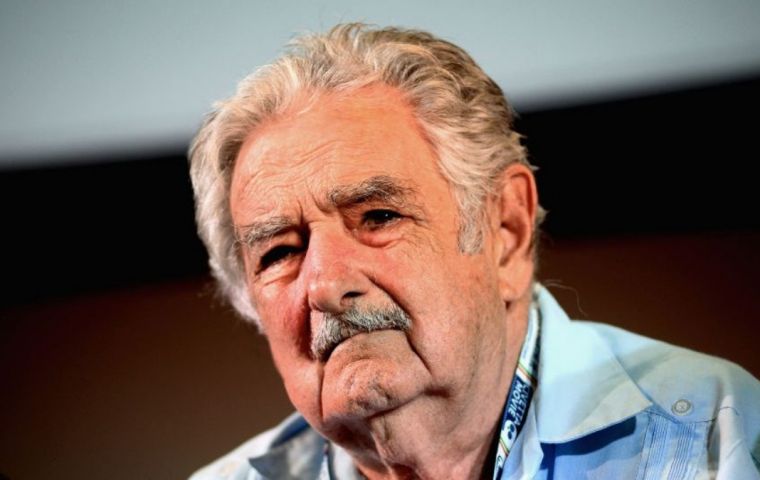MercoPress. South Atlantic News Agency
Buenos Aires key to the region's future, says Pepe Mujica
 Mujica said the future of the River Plate depends on whatever happens in Buenos Aires
Mujica said the future of the River Plate depends on whatever happens in Buenos Aires Former Uruguayan President José “Pepe” Mujica said this weekend in a newspaper interview that the future of the River Plate area was at stake and it hinged on whatever happens in the Argentine capital.
“If I were 40 years younger, I would become an Argentine citizen and go fight in Buenos Aires,” Mujica was quoted as saying by the Perfil newspaper.
Mujica insisted on the importance of the city and port of Buenos Aires for the future of the region. “Although the Argentine organization led to federalism, there is no doubt that the tip of the funnel was built in Buenos Aires. Such concentration is perhaps a pending problem. With this vision that I have today as an old man, and aware of the history of the Río de la Plata, if I were forty years younger, I would become an Argentine citizen and go to fight in Buenos Aires. That is where the future of the Río de la Plata is at stake. But I am an old man and I am archived,” Mujica stressed.
“If I did politics in Argentina I would try to aim more at work and science and less at luxury and chrome,” he went on.
Asked if an Uruguayan version of Jair Bolsonaro would be imaginable, Mujica was blunt: “No, I don't think so.”
Fanaticism “generates hatred, which is a very negative and tremendously destructive position,” Mujica explained. “It has in common with love that it is blind, and blindness is a form of stupidity. It is one thing to be passionate and convinced of what one defends and another is to fall into fanaticism, which does not allow one to perceive the tones of reality. In high politics, it is a greater evil to live with hatred, but in human relationships, it is worse: fills us with stupidity.”
Regarding his hug with fellow former President Julio María Sanguinetti on the occasion of his retirement from politics, Mujica admitted: “it suited the country and society.”
“If one allows oneself to be absorbed and blinded by the past, one forgets the value of those who come. If we can't give them a better world, let's at least try not to make it worse,” Mujica insisted. “I was president and I did not dedicate myself to using the power of the presidency to persecute anyone. It may have seemed to some that I am forgetful. No. There are scores which are not closed.”
Regarding Argentine politics. Mujica's advice was to build “common points.”
“It is very easy to destroy. Building is very difficult, but when something is built, it remains in time. If not, we are always starting,” he pointed out. “I belong to a time when (...) we were certain that Uruguay would end in a dictatorship,” he also said. But “some keys that we interpreted were wrong.”
Mujica also highlighted heroes were just human and they “do not determine the changes in history,” which “come through great currents that sometimes use a human symbol, hero, flag or leader, but what matters is what is not seen.” He also said he would have recommended dialogue after Argentina's results at the Mandatory, Open and Simultaneous Primary (PASO) elections but there were too many difficulties for that, for which he was sorry.
“I feel like a first cousin of Argentina,” he said. “And I am also an interested party because my little country does well when Argentina does well.”




Top Comments
Disclaimer & comment rulesCommenting for this story is now closed.
If you have a Facebook account, become a fan and comment on our Facebook Page!